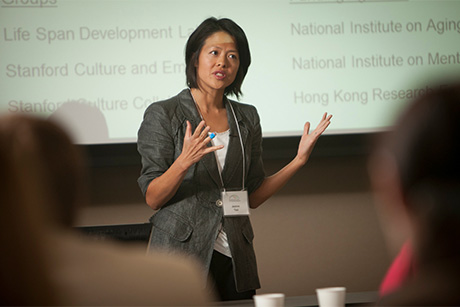Experts explore roots of healthy aging
By Karene Booker

Recent scientific advances demonstrate the profound effects of emotion on physical health, even how long we live and what diseases we die from. Likewise, there is growing evidence for the effects of aging on our emotions. Both streams of research shed light on root causes of disease and pathways to lifelong health, which is why researchers gathered on campus Oct. 3-4 to better understand the interplay between emotions and health across the lifespan.
The Fourth Biennial Urie Bronfenbrenner Conference, “New Developments in Aging, Emotion and Health,” drew scholars from as far away as Europe to share research on the nature of age differences in emotions, how emotions influence health, the underlying biological and behavioral mechanisms, and possibilities for leveraging these discoveries to promote healthy aging.
“We convened a temporary think tank of long-standing and rising leaders in the two fields to create some unlikely encounters and novel ideas,” said Corinna Loeckenhoff, assistant professor of human development in the College of Human Ecology and director of the Cornell Healthy Aging Laboratory. “We expect the intellectual exchange and networking will lead to new conceptual developments as well as policy and translation opportunities with real-world implications,” she said. Loeckenhoff co-organized the conference with Anthony Ong, associate professor of human development.
Many of those who participated are pioneers in their fields. Laura Carstensen, a professor of psychology and the founding director of the Stanford Center on Longevity, for example, is best known for her theory about how people’s motivations change as they age. She reviewed her recent research on leveraging older adults’ preference for the positive to improve health behaviors. Positive messages about the benefits of exercise, it turns out, are more effective than negative messages about risks of inactivity in motivating older adults to walk regularly. Such insights could revolutionize efforts to help America’s growing population of older adults remain active, she said.
Cornell neuroscientist Adam Anderson, associate professor of human development, said that his research suggests that positive emotions are associated with increased cognitive flexibility and creative problem solving, and this may be due to neural changes that impair selective attention. The aging brain, he says, exhibits this same “leaky filter” pattern. More information can slow down thinking, but there’s an upside as well, he proposed – the rose colored glasses of positivity broaden our field of view and help us see remote connections.
Alex Zautra of Arizona State University, who studies resilience and interventions that help people bounce back from stressors and adversity, shared his recent research on the crucial role of social ties in “unlocking” resilience and his initiative to develop online social intelligence training to help people build and maintain social ties.
Participants (who included other renowned scholars such as George Bonanno, Columbia University; Michaela Riediger, the Max Plank Institute for Human Development; and Laura Kubzansky, Harvard School of Public Health) also debated core assumptions about emotional regulation and personality, the effects of culture, environment and technology, and their implications for policy and practice.
The American Psychological Association plans to publish a book based on the papers presented at the conference, which was sponsored by Cornell’s Bronfenbrenner Center for Translational Research, Institute for the Social Sciences and Department of Human Development; the Scientific Research Network on Decision Neuroscience and Aging; Constance F. Ferris; and Liese Bronfenbrenner.
Karene Booker is an extension support specialist in the Department of Human Development.
Media Contact
Get Cornell news delivered right to your inbox.
Subscribe